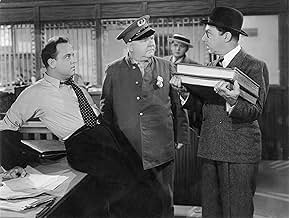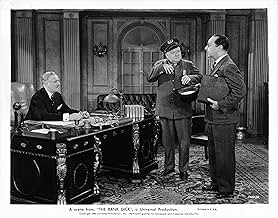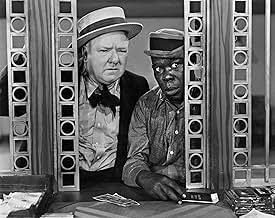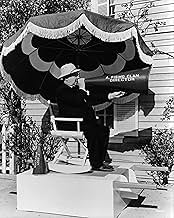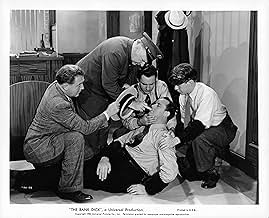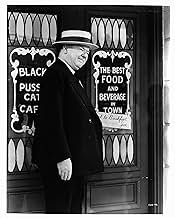VALUTAZIONE IMDb
7,1/10
8033
LA TUA VALUTAZIONE
Aggiungi una trama nella tua linguaHenpecked Egbert Sousé has comic adventures as a substitute film director and unlikely bank guard.Henpecked Egbert Sousé has comic adventures as a substitute film director and unlikely bank guard.Henpecked Egbert Sousé has comic adventures as a substitute film director and unlikely bank guard.
- Regia
- Sceneggiatura
- Star
- Premi
- 1 vittoria in totale
Dick Purcell
- Mackley Q. Greene
- (as Richard Purcell)
Recensioni in evidenza
THE BANK DICK (Universal, 1940), directed by Edward Cline, from an original story and screenplay by Mahatma Kane Jeeves, better known as W.C. Fields, stars none other than W.C. Fields in his third of four comedies for Universal, a classic in the sense of it becoming his most famous and admired works next to IT'S A GIFT (Paramount, 1934). Unlike YOU CAN CHEAT AN HONEST MAN (1939) where Fields loses screen time in favor with a ventriloquist act of Edgar Bergen and Charlie McCarthy; MY LITTLE CHICKADEE (1940) in which he divides his time with Mae West; and NEVER GIVE A SUCKER AN EVEN BREAK (1941) where he steps aside in favor for the singing of the teen-age Gloria Jean, THE BANK DICK is pure Fields from start to finish. As the head of a household of a dysfunctional family, with Fields playing the henpecked husband on screen for the last time, the supporting players consists of a fine assortment of character actors who can be just as funny as Fields himself and not draw attention away from him.
As for the story, set in the town of Lompoc, the focus obviously is on Egbert Souse, accent over the final "E" (W.C. Fields), an unemployed husband who spends much of his leisure time smoking cigarettes and hanging around the local bar, The Black Pussy Cat Cafe, as well as coping with Agatha, his wife, (Cora Witherspoon), Mrs. Hermisillo Brunch, his mother-in-law (Jessie Ralph), Myrtle, his adult daughter, (Una Merkel) and Elsie Mae Adele Brunch, the obnoxious youngster, (Evelyn Del Rio). Of the members in his family, only Myrtle, his eldest, understands him. Aside from being a character herself, she's in love with the hayseed Og Oggilby (Grady Sutton), a bank teller who later encounters a couple of robbers at his window and forced to hand over a large sum of money at a point of a gun. When their getaway car is taken away, the crooks make a run for it. Chased by the police, one gets away while the other is found by Souse seated on a bench nearby, making him a hero for "capturing the crook." In gratitude Souse is awarded a job as a special officer by Mr. Skinner (Pierre Watkin), the bank president. In order for Oggilby to earn enough money to marry Myrtle, Souse arranges for him to invest the bank's money on Beefstake Mines Stock, which finds Souse spending much time preventing the visiting bank examiner (Franklin Pangborn) from looking over the books to find a shortage. More complications occur when the bank gets robbed again with Souse being forced to take the driver's seat in another exciting car chase from the police.
Supporting players enacting under oddball names include Shemp Howard (Joe Guelpe, the bartender whose whistle to "Listen to the Mockingbird" entices Souse to follow him to the bar); Richard Purcell (Mackley Q. Greene); Russell Hicks (J. Frothingham Waterbury); Jack Norton (A. Pismo Clam); Bill Wolfe (Otis), with Jan Duggan, another favorite of the Fields stock players, once again doing a funny bit in a wonderful cameo set in the bank. While Al Hill is credited as Filthy McNasty in the credits, he is called Repulsive Rogan in the final story. As for the support provided by the diversified Una Merkel, her performance is unlike the assortment of starlets, ranging from Mary Brian, Judith Allen or Constance Moore as Fields' daughters playing their roles in a more serious-minded and caring fashion. Merkel provides her role with comic flare and free-spirit. She and and Grady Sutton (in his final Fields comedy) certainly make a perfect odd couple.
THE BANK DICK may have some flaws, such as having the audience accept the middle-aged Fields and Cora Witherspoon as parents to a minor child while physically they pass more as grandparents. However, overlooking such minor details, highlights include Souse filling in for a drunken director (Norton) of Tel-Avis Picture Productions, a movie company filming on location; Sousé getting the bank examiner (Pangborn) ill on a "Michael Finn" drinks in order to keep him from examining the books; the climatic car chase; and bank president Mr. Skinner on two separate occasions giving Sousé the "hearty hand clasp" in which Skinner's fingers barely touches Souse's outstretched palm heightened by going to a split-second freeze-frame. While the attention is focused more on Souses' outside activities than on his domestic affairs, one cannot ignore the underscoring to "There's No Place Like Home" used during each opening scene at the Souse household.
THE BANK DICK, along with MY LITTLE CHICKADEE, became the first of Fields' comedies to be distributed on cassette during the early days of home video in the 1980s. Other than frequent revivals on commercial television prior to 1990, THE BANK DICK assured popularity to a new generation when shifted over to cable stations as American Movie Classics (1995-1999), and later Turner Classic Movies since 2001.
Fields' fourth and final starring role for Universal being NEVER GIVE A SUCKER AN EVEN BREAK (1941) not only reunites him with Franklin Pangborn, but opens and closes with the same underscoring from THE BANK DICK. It even has an in-joke of Fields, playing himself, standing in front of a billboard advertisement which reads "W.C. Fields in THE BANK DICK." Because of these similarities, these both Fields comedies make logical choices as double features whether on television or a DVD package. As THE BANK DICK is a fun movie, it's kind of sad in a way watching W.C. Fields, older and heavier, in what's to become the final phase to his long career. All good things come to an end but the legend of Fields and his movies lives on. (***)
As for the story, set in the town of Lompoc, the focus obviously is on Egbert Souse, accent over the final "E" (W.C. Fields), an unemployed husband who spends much of his leisure time smoking cigarettes and hanging around the local bar, The Black Pussy Cat Cafe, as well as coping with Agatha, his wife, (Cora Witherspoon), Mrs. Hermisillo Brunch, his mother-in-law (Jessie Ralph), Myrtle, his adult daughter, (Una Merkel) and Elsie Mae Adele Brunch, the obnoxious youngster, (Evelyn Del Rio). Of the members in his family, only Myrtle, his eldest, understands him. Aside from being a character herself, she's in love with the hayseed Og Oggilby (Grady Sutton), a bank teller who later encounters a couple of robbers at his window and forced to hand over a large sum of money at a point of a gun. When their getaway car is taken away, the crooks make a run for it. Chased by the police, one gets away while the other is found by Souse seated on a bench nearby, making him a hero for "capturing the crook." In gratitude Souse is awarded a job as a special officer by Mr. Skinner (Pierre Watkin), the bank president. In order for Oggilby to earn enough money to marry Myrtle, Souse arranges for him to invest the bank's money on Beefstake Mines Stock, which finds Souse spending much time preventing the visiting bank examiner (Franklin Pangborn) from looking over the books to find a shortage. More complications occur when the bank gets robbed again with Souse being forced to take the driver's seat in another exciting car chase from the police.
Supporting players enacting under oddball names include Shemp Howard (Joe Guelpe, the bartender whose whistle to "Listen to the Mockingbird" entices Souse to follow him to the bar); Richard Purcell (Mackley Q. Greene); Russell Hicks (J. Frothingham Waterbury); Jack Norton (A. Pismo Clam); Bill Wolfe (Otis), with Jan Duggan, another favorite of the Fields stock players, once again doing a funny bit in a wonderful cameo set in the bank. While Al Hill is credited as Filthy McNasty in the credits, he is called Repulsive Rogan in the final story. As for the support provided by the diversified Una Merkel, her performance is unlike the assortment of starlets, ranging from Mary Brian, Judith Allen or Constance Moore as Fields' daughters playing their roles in a more serious-minded and caring fashion. Merkel provides her role with comic flare and free-spirit. She and and Grady Sutton (in his final Fields comedy) certainly make a perfect odd couple.
THE BANK DICK may have some flaws, such as having the audience accept the middle-aged Fields and Cora Witherspoon as parents to a minor child while physically they pass more as grandparents. However, overlooking such minor details, highlights include Souse filling in for a drunken director (Norton) of Tel-Avis Picture Productions, a movie company filming on location; Sousé getting the bank examiner (Pangborn) ill on a "Michael Finn" drinks in order to keep him from examining the books; the climatic car chase; and bank president Mr. Skinner on two separate occasions giving Sousé the "hearty hand clasp" in which Skinner's fingers barely touches Souse's outstretched palm heightened by going to a split-second freeze-frame. While the attention is focused more on Souses' outside activities than on his domestic affairs, one cannot ignore the underscoring to "There's No Place Like Home" used during each opening scene at the Souse household.
THE BANK DICK, along with MY LITTLE CHICKADEE, became the first of Fields' comedies to be distributed on cassette during the early days of home video in the 1980s. Other than frequent revivals on commercial television prior to 1990, THE BANK DICK assured popularity to a new generation when shifted over to cable stations as American Movie Classics (1995-1999), and later Turner Classic Movies since 2001.
Fields' fourth and final starring role for Universal being NEVER GIVE A SUCKER AN EVEN BREAK (1941) not only reunites him with Franklin Pangborn, but opens and closes with the same underscoring from THE BANK DICK. It even has an in-joke of Fields, playing himself, standing in front of a billboard advertisement which reads "W.C. Fields in THE BANK DICK." Because of these similarities, these both Fields comedies make logical choices as double features whether on television or a DVD package. As THE BANK DICK is a fun movie, it's kind of sad in a way watching W.C. Fields, older and heavier, in what's to become the final phase to his long career. All good things come to an end but the legend of Fields and his movies lives on. (***)
As I understand it, W.C. Fields spent at least most of his career playing henpecked drunks. Believe it or not, "The Bank Dick" is the first of his movies that I've ever seen; and I really liked it. Fields plays Egbert Souse - with an acute accent on the E - a bored family man never too aware of his surroundings. One day, he accidentally stops a bank robber but is only too happy to take credit for it. So they make him a security guard.
Throughout parts of the movie, I wasn't sure whether it was going to be as funny as I usually like (and there was a scene portraying a black man in a manner that wouldn't be allowed nowadays), but it was quite entertaining overall and the whole chase was certainly beyond a hoot. I suspect that they had a lot of fun filming it. Moreover, one might interpret Fields's as a look at America's aspirations of getting out of the Depression (that's pure conjecture, so don't quote me).
So, having seen this movie, I understand what W.C. Fields's brand of humor constituted. One can see why Warner Bros. animation department liked to caricature him as a manipulative pig in some cartoons. Worth seeing.
Throughout parts of the movie, I wasn't sure whether it was going to be as funny as I usually like (and there was a scene portraying a black man in a manner that wouldn't be allowed nowadays), but it was quite entertaining overall and the whole chase was certainly beyond a hoot. I suspect that they had a lot of fun filming it. Moreover, one might interpret Fields's as a look at America's aspirations of getting out of the Depression (that's pure conjecture, so don't quote me).
So, having seen this movie, I understand what W.C. Fields's brand of humor constituted. One can see why Warner Bros. animation department liked to caricature him as a manipulative pig in some cartoons. Worth seeing.
A classic comedy from the irreverent W. C. Fields who unapologetically dismantles as many of the Production Code's rules as he can as he frequents the Black Pussy, a bar managed by Shemp Howard, one-third of the Three Stooges. The plot is secondary to the gags, which come thick and fast; they don't always hit, but when they do they're smack bang in the centre of the bullseye.
"The Bank Dick" is the most consistently funny comedy from W.C Fields. The routines and the dialogue are far above average, as is Fields himself. The plot concerns a small town loafer who first becomes a movie director during a film's shoot. Later on, he accidentally foils an attempted robbery at the local bank. For his reward, W.C Fields is employed as the bank's security guard. All kinds of comic mayhem ensure! Released in 1940, "The Bank Dick" was about the last film of any quality from W.C Fields. He only lived a few more years and his chronic drinking was getting the better of him. The laughs are pretty good here and Fields has dialogue that's worthy of his style.
This is the second best Fields film (after It's a Gift) and it's similar in that it casts Fields as the lovable drunk with an absolutely hateful family. From the almost surreal episode directing the movie to the eye-poppingly ridiculous chase scene, this one is pure comic entertainment. One side note: it's sad and not a little scary how bloated and tired the Great Man looks in this compared to just six years earlier when It's a Gift was released.
Lo sapevi?
- Quiz"Mahatma Kane Jeeves" (the pseudonym used by W.C. Fields as screenwriter) is a play on words from stage plays of the era. "My hat, my cane, Jeeves!" And in fact, at the end of the film his butler does hand him his hat and his cane.
- BlooperWhen W.C. Fields enters the hotel room of J. Pinkerton Snoopington, a hand can be seen on the doorknob on the other side pulling the door shut.
- Citazioni
Egbert Sousé: [at the bar of the Black Pussy Cat cafe] Was I in here last night and did I spend a twenty dollar bill?
Joe Guelpe: Yeah.
Egbert Sousé: Oh boy, what a load that is off my mind! I thought I'd lost it.
- ConnessioniFeatured in Frances Farmer Presents: Bank Dick (1958)
- Colonne sonoreHome Sweet Home
(1823) (uncredited)
Music by H.R. Bishop
Background music near the beginning of the movie and at the end
I più visti
Accedi per valutare e creare un elenco di titoli salvati per ottenere consigli personalizzati
Dettagli
- Tempo di esecuzione1 ora 12 minuti
- Colore
- Proporzioni
- 1.37 : 1
Contribuisci a questa pagina
Suggerisci una modifica o aggiungi i contenuti mancanti

Divario superiore
By what name was Un comodo posto in banca (1940) officially released in Canada in English?
Rispondi
